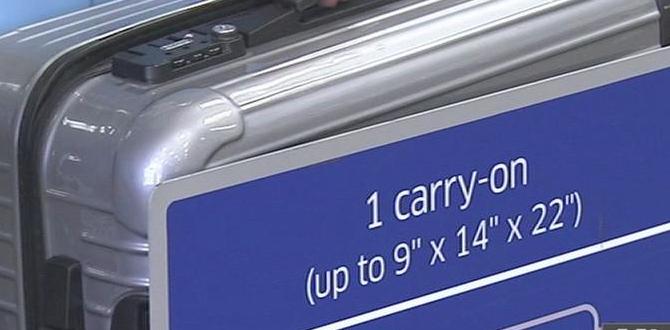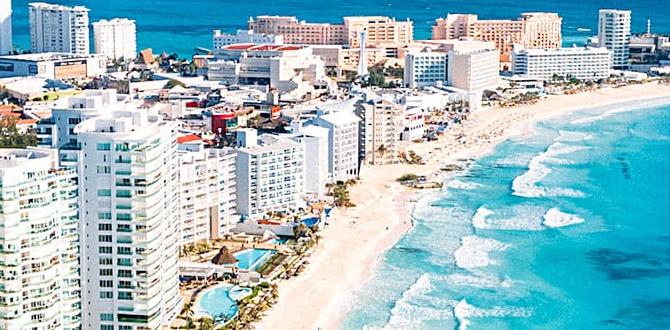Accra Summer Trip Guide: Your Essential Summer Essential. Planning for Accra in the summer means packing light, staying cool, and embracing the vibrant culture. This guide provides simple steps to ensure a comfortable and unforgettable trip, focusing on smart packing and local experiences.
Summer in Accra is a unique experience, filled with warmth, sunshine, and the lively pulse of Ghanaian culture. It’s a fantastic time to visit, but planning can sometimes feel a bit overwhelming, especially when thinking about what to pack to stay comfortable. Let’s face it, navigating a new city in the heat can be challenging if you’re not prepared. But don’t worry! This guide is here to help. We’ll break down exactly what you need to know to make your Accra summer trip smooth, enjoyable, and truly memorable. Get ready for an adventure filled with delicious food, stunning sights, and warm welcomes!
Why Accra in the Summer?
Choosing Accra for your summer getaway offers a blend of rich history, bustling markets, and beautiful coastlines. The summer months, generally from June to September, fall within Accra’s “second rainy season,” but this often translates to shorter, refreshing downpours rather than all-day monsoons. This period can be less crowded than other times of the year, offering a more immersive cultural experience. The city buzzes with energy, from the vibrant street life to the fantastic music scene. It’s the perfect time to explore historical landmarks, relax on the beach, and savor authentic Ghanaian cuisine. For travelers seeking an authentic African experience without extreme heat, Accra in the summer is an excellent choice.
Your Essential Accra Summer Trip Toolkit
When heading to Accra for the summer, being prepared is key to maximizing your enjoyment and minimizing any potential discomfort. This toolkit focuses on essentials that will keep you cool, protected, and ready to explore. Think smart, light, and practical items designed for a warm, humid climate. We’ll cover everything from what to wear to what to carry, ensuring you feel confident and comfortable throughout your journey.
Packing Essentials: Staying Cool and Comfortable
The Ghanaian climate is typically warm and humid year-round, with summer presenting its own unique atmospheric conditions. Packing lightweight, breathable clothing is paramount. Think natural fabrics that allow your skin to breathe and can help wick away moisture. Layers can be your best friend, allowing you to adjust to changing temperatures or air-conditioned interiors.
Clothing Choices:
- Lightweight Tops: Cotton, linen, or moisture-wicking synthetic t-shirts, tank tops, and blouses. Opt for lighter colors to reflect sunlight.
- Breathable Bottoms: Loose-fitting shorts, skirts, and trousers made from linen or light cotton blends.
- Dresses: Sundresses and maxi dresses in light fabrics are perfect for both casual outings and slightly dressier occasions.
- Light Outerwear: A light, long-sleeved shirt or a thin cardigan can be useful for evenings or a bit of sun protection.
- Swimwear: If you plan to visit the beach or a hotel pool, pack your favorite swimwear.
- Comfortable Footwear: Sandals, flip-flops, and comfortable walking shoes are essential. Consider shoes you don’t mind getting a little dusty or potentially wet.
Sun Protection: Safeguarding Against the Rays
Accra receives a significant amount of sunshine, even during the “rainy” season. Protecting your skin and eyes is not just about comfort; it’s about your health. Investing in good quality sun protection will allow you to explore outdoor attractions without worry.
Sun Protection Gear:
- Sunscreen: A broad-spectrum sunscreen with an SPF of 30 or higher is non-negotiable. Reapply frequently, especially after swimming or sweating. The American Academy of Dermatology offers excellent tips on choosing and using sunscreen effectively.
- Hat: A wide-brimmed hat provides excellent shade for your face, neck, and ears.
- Sunglasses: Protect your eyes from harmful UV rays with a good pair of sunglasses.
- Lip Balm with SPF: Don’t forget your lips! A balm can prevent sunburn and chapping.
Health and Personal Care: Staying Fresh and Prepared
Maintaining personal hygiene and comfort is crucial, especially in a tropical climate. Consider items that help you feel fresh throughout the day.
Personal Care Items:
- Insect Repellent: Malaria and other insect-borne diseases are present. Use repellent containing DEET or Picaridin, especially during dawn and dusk. The Centers for Disease Control and Prevention (CDC) provides comprehensive travel health recommendations for Ghana.
- Hand Sanitizer: Useful for when soap and water aren’t readily available.
- Wet Wipes/Body Wipes: For a quick refresh on a hot day.
- Lightweight Towel: A quick-drying travel towel can be handy.
- Personal Medications: Bring any prescription medications and a basic first-aid kit including pain relievers, antiseptic wipes, and bandages.
- Travel-Sized Toiletries: Shampoo, conditioner, soap, and any personal grooming items you prefer.
For Families: Comfort and Convenience with Little Ones
Traveling with children, especially in a warm climate, requires extra preparation. Ensuring comfort and managing needs like diaper changes makes a huge difference. Many parents find that discreet and reliable adult or child diapers can offer peace of mind for longer outings or travel days.
Family Travel Must-Haves:
- Diapering Supplies: If you are traveling with infants or young children who use diapers, packing an adequate supply is essential. Consider the number of days you’ll be there and the typical usage. Look for options that are discreet, absorbent, and comfortable for your child. Brands offering specialized adult incontinence products can also serve as highly absorbent and discreet options for older children or individuals with special needs during travel.
- Child-Friendly Snacks: Pack familiar snacks to keep children happy, especially during transit or while exploring.
- Entertainment: Books, small toys, or tablets can help pass the time.
- Lightweight Stroller or Carrier: If applicable, choose something easy to fold and carry.
- First-Aid Kit for Kids: Include child-specific medications and supplies.
Navigating Accra: Essential Tips for a Smooth Trip
Accra is a dynamic city that rewards exploration. Understanding a few local customs and practicalities will enhance your experience and ensure you get the most out of your visit. From getting around to staying hydrated, these tips are designed to make your summer adventure seamless.
Getting Around Accra:
Transportation in Accra can be an adventure in itself. While taxis are plentiful, agreeing on a fare beforehand is crucial. Ride-sharing apps like Uber and Bolt are also popular and can offer fixed prices, making budgeting easier. For a truly local experience, you might consider tro-tros (shared minibuses), but be prepared for a more… energetic ride! For longer distances or specific tours, hiring a private car and driver can offer comfort and convenience, especially if you’re traveling with family or a group.
Staying Hydrated:
The heat and humidity in Accra mean staying hydrated is vital. Always carry a reusable water bottle and refill it often. Bottled water is readily available from street vendors and shops. Avoid drinking tap water unless it has been purified or boiled. Electrolyte drinks can also be beneficial on particularly hot days to replenish essential minerals lost through sweat.
Cultural Etiquette:
Ghana is known for its hospitality, but understanding basic etiquette will ensure respectful interactions. Greetings are important; a simple ‘hello’ and handshake are customary. When visiting the north of Ghana, longer discussions might be preferred before getting down to business. Dress modestly when visiting religious sites or rural areas. It’s polite to use your right hand when giving or receiving items, as the left hand is traditionally considered unclean.
Food and Drink: A Taste of Ghana
Ghanaian cuisine is flavorful and diverse. Be adventurous and try some local specialties! Be mindful of where you eat, especially when sampling street food. Opt for popular stalls with high turnover, where food is cooked fresh and hot. Popular dishes include:
- Jollof Rice: A beloved West African dish, Ghana’s version is a flavorful rice cooked with tomatoes, onions, and spices.
- Fufu: A starchy staple made from pounded cassava and plantain, typically eaten with soup.
- Banku: A fermented corn and cassava dough, often served with grilled fish or okra soup.
- Waakye: Rice and beans cooked together with sorghum leaves, giving it a distinctive color and flavor, usually served with various accompaniments.
When it comes to drinks, local beers like Guinness and Star are popular. For non-alcoholic options, Malta, soft drinks, and fresh fruit juices are widely available. Avoid ice in drinks if you are concerned about water quality, though in reputable establishments, it’s usually made from purified water.
Exploring Accra: Must-See Attractions
Accra offers a wealth of attractions for every type of traveler. During the summer, many attractions are accessible, though planning for potentially sunny or brief rainy spells is wise.
Historical and Cultural Sites:
- Independence Square: A significant national monument symbolizing Ghana’s independence from British colonial rule.
- Kwame Nkrumah Mausoleum: Dedicated to Ghana’s first president, this is a must-visit for history enthusiasts.
- National Museum of Ghana: Showcases Ghanaian art, culture, and history.
- Jamestown: The historic heart of Accra, with its colonial architecture, vibrant fishing community, and street art.
Relaxation and Nature:
- Labadi Beach: A popular urban beach, perfect for a stroll, swimming, or enjoying local music and food.
- Bojo Beach: Accessible by a short boat ride, offering a more secluded and pristine beach experience.
- Aburi Botanical Gardens: A pleasant escape from the city heat, offering lush greenery and scenic views.
Markets and Arts:
- Makola Market: A bustling and colorful marketplace where you can find almost anything. It’s an immersive, sensory experience.
- Osu Night Market (if open during your visit): A great place to sample local street food and crafts.
- Artists Alliance Gallery: Features contemporary Ghanaian art and sculptures.
A Sample Accra Summer Trip Itinerary (5 Days)
This suggested itinerary balances cultural immersion, relaxation, and culinary exploration, keeping in mind the summer climate.
| Day | Morning (Approx. 9 AM – 1 PM) | Afternoon (Approx. 2 PM – 5 PM) | Evening (Approx. 6 PM onwards) |
|---|---|---|---|
| Day 1 | Arrive at Kotoka International Airport (ACC). Transfer to hotel, check-in. | Light exploration and settling in. Visit Independence Square. | Dinner at a local restaurant in Osu, explore the Oxford Street area. |
| Day 2 | Explore Jamestown: Lighthouse, fishing harbor. Immerse in the local atmosphere. | Visit the Kwame Nkrumah Mausoleum and the National Museum (check current operating status). | Enjoy street food and live music, potentially in the Osu or Jamestown area. |
| Day 3 | Day trip to Aburi Botanical Gardens for a cooler, greener experience. Pack light snacks and water. |
Return to Accra. Relax at the hotel or a local café. | Dinner experience – perhaps try waakye or banku at a popular local eatery. |
| Day 4 | Beach day: Head to Labadi Beach for relaxation, swimming, and soaking up the sun (use plenty of sunscreen!). |
Visit the Artists Alliance Gallery to appreciate Ghanaian art. | Farewell dinner at a restaurant offering panoramic city views. |
| Day 5 | Morning: Last-minute souvenir shopping at a craft market. | Pack and prepare for departure. | Transfer to Kotoka International Airport (ACC) for your flight. |
Frequently Asked Questions About Accra Summer Trips
Here are some common questions travelers have about visiting Accra during the summer months.
Q1: What is the weather like in Accra during the summer?
A1: Summer in Accra (June-September) is typically warm and humid. While it’s considered the “second rainy season,” showers are often short and refreshing, usually occurring in the late afternoon or evening. Daytime temperatures usually range from 27°C to 31°C (80°F to 88°F).
Q2: Do I need vaccinations for Ghana?
A2: It’s highly recommended to consult with a healthcare professional or travel clinic well in advance of your trip. Yellow Fever vaccination is typically required for entry into Ghana. Malaria prophylaxis is also strongly advised. For the most current and authoritative information, check the CDC’s travel page for Ghana.
Q3: Is Accra safe for tourists?
A3: Like any major city, Accra has areas where caution is advised. Common sense precautions such as being aware of your surroundings, avoiding displaying valuable items, and not walking alone at night in unfamiliar areas are recommended. Petty theft can occur, so keeping valuables secure is important. The U.S. Department of State provides travel advisories for Ghana.
Q4: What currency is used in Ghana?
A4: The official currency in Ghana is the Ghanaian Cedi (GHS). It’s advisable to have some cash on hand for smaller purchases, taxis, and markets. Major hotels and larger establishments often accept credit cards, but it’s not universal. ATMs are available in Accra, but inform your bank about your travel plans.
Q5: What should I know about transportation within Accra?
A5: Taxis are readily available, but always negotiate the fare before starting your journey. Ride-sharing apps like Uber and Bolt are popular and offer convenience with upfront pricing. For a more local experience, consider “tro-tros,” but be aware they can be crowded and follow set routes. Hiring a private driver for a day can be a comfortable option for exploring multiple sites.
Q6: Is it okay to drink tap water in Accra?
A6: It is generally not recommended to drink tap water in Accra due to potential contamination. Stick to bottled water or water that has been purified or boiled. Many hotels provide filtered water for guests.
Q7: What are the best ways to stay cool during the summer?
A7: The best ways include wearing light, breathable clothing, staying hydrated by drinking plenty of water, seeking shade during the hottest parts of the day (midday), and taking advantage of air-conditioned spaces like hotels, shopping centers, and museums during peak heat. Light, refreshing snacks and meals also help.
Conclusion
Your Accra summer trip promises to be an enriching and vibrant experience. By focusing on practical essentials like light clothing, robust sun protection, and staying hydrated, you’ve already laid the groundwork for comfort and enjoyment. Remember that the warmth extends beyond the weather to the people of Ghana, whose hospitality is truly remarkable. Embracing the local culture, savoring the diverse cuisine, and exploring the unique historical and natural attractions will create lasting memories. Whether you’re navigating bustling markets, relaxing on the coast, or delving into Ghana’s rich history, this guide has equipped you with the knowledge to make your summer adventure in Accra seamless and unforgettable. Pack smart, stay open-minded, and get ready to discover the magic of Accra!





